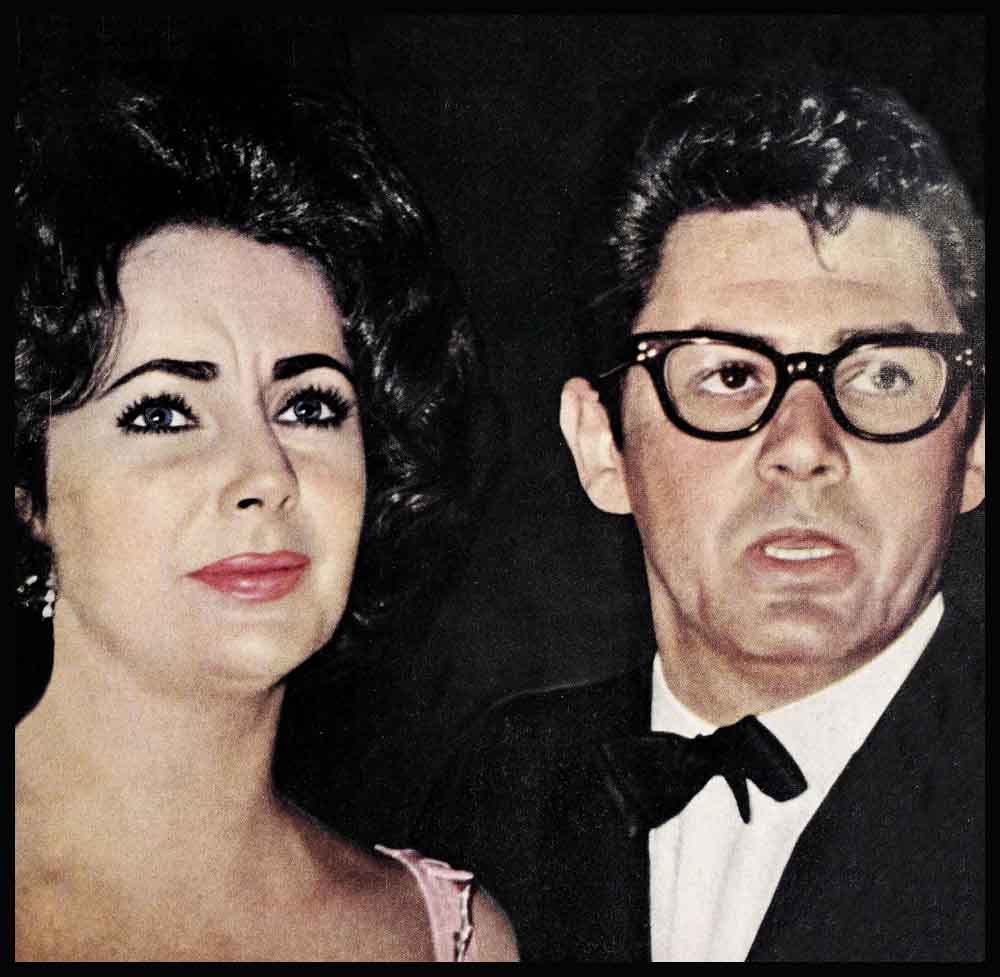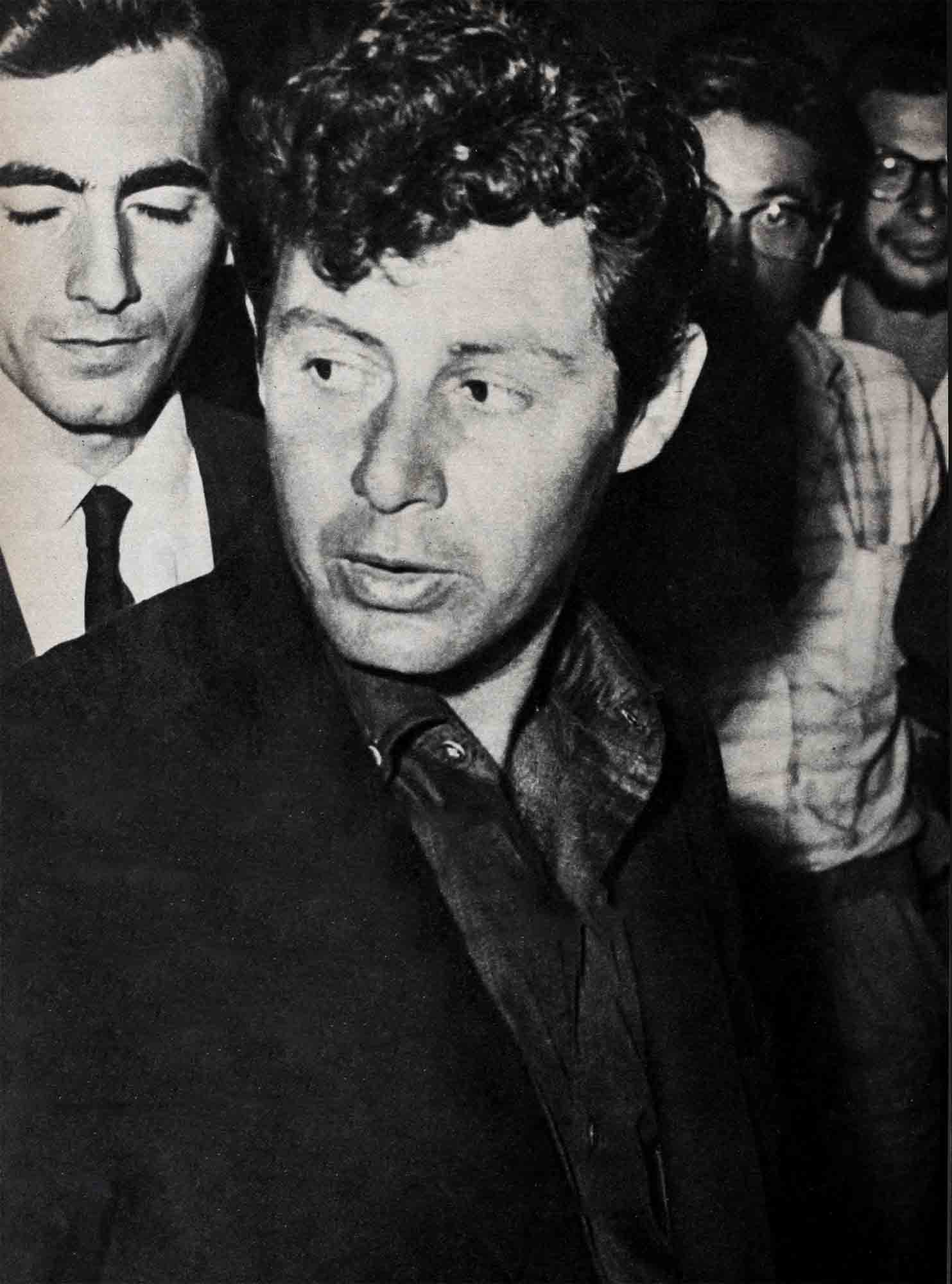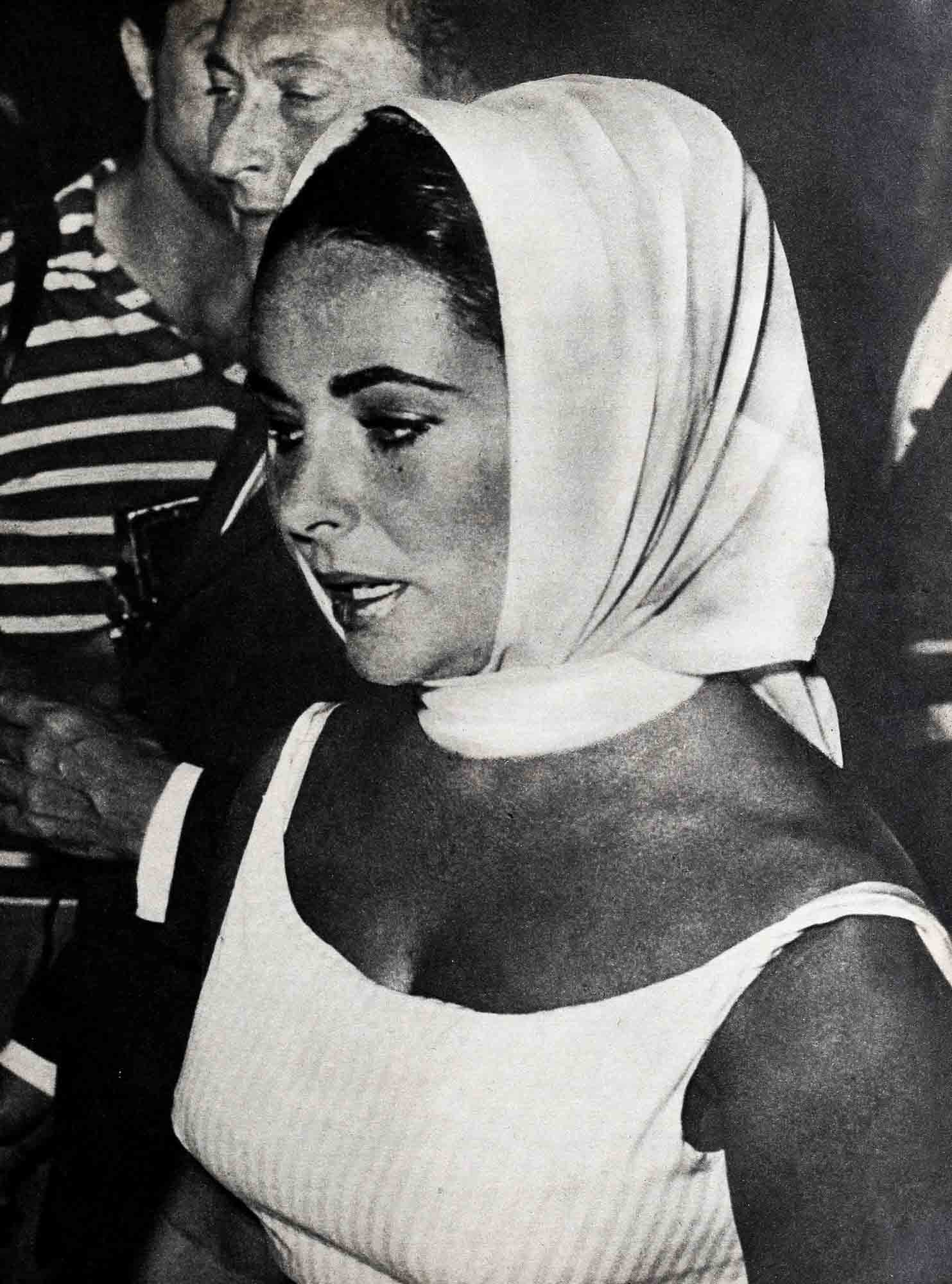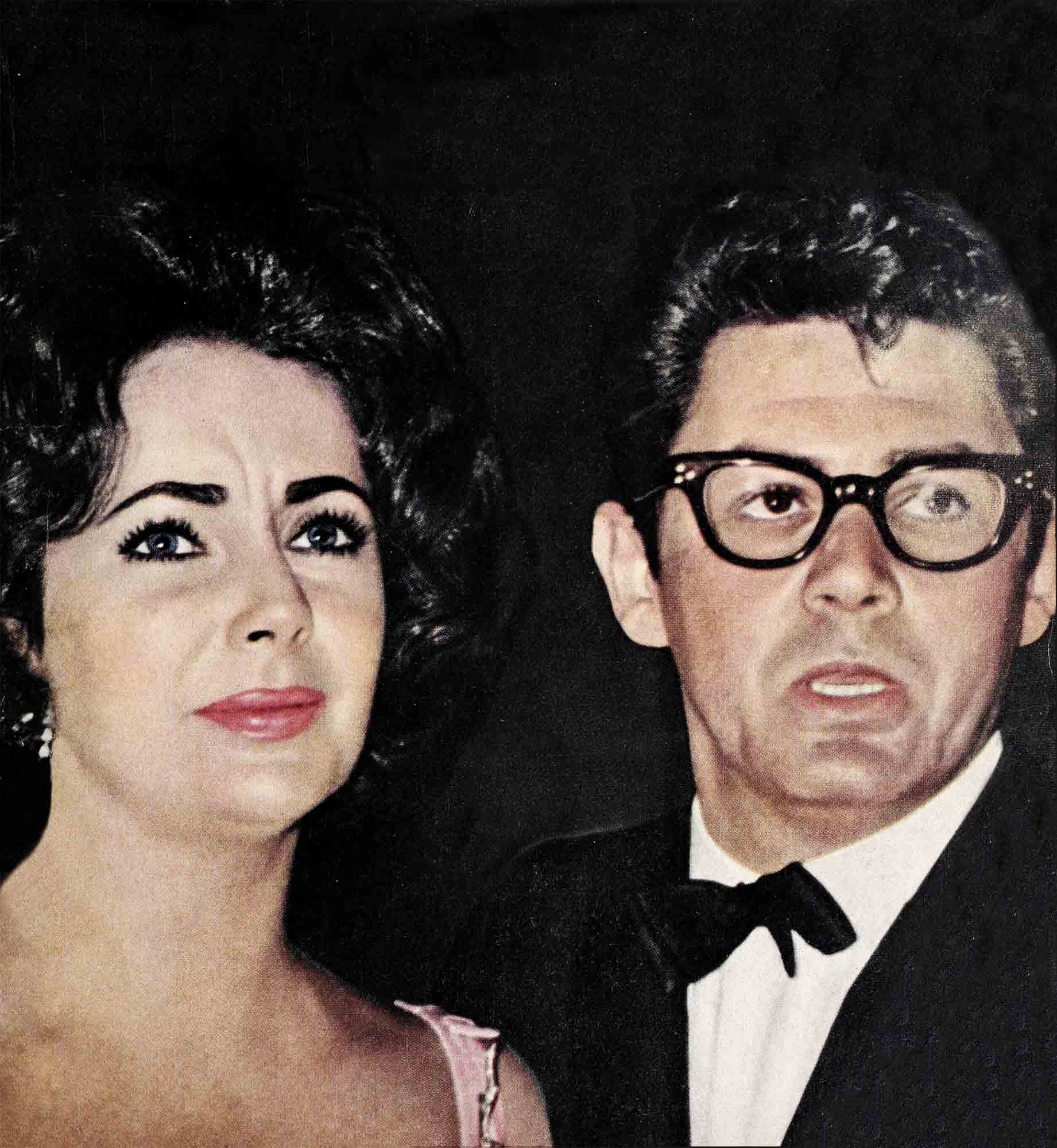
Elizabeth Taylor And Eddie Fisher
“Please Eddie, don’t let them take the children away,” Liz cried. The silent crowd, almost as if aware of the tragedy ahead, stood grimly by. There was a feeling of apprehension in the air, a feeling of impending terror.
Liz and Eddie had just arrived in London after a considerable amount of travel, Liz to start work on her latest motion picture, “Cleopatra.” She did not look like the Queen of the Nile, but rather like a tired mother at the end of a long journey. Eddie, too, looked harassed. But soon they would be away from the crowd, alone with the children in the suite at the hotel.
It was one of those soggy days that come so often to the British Isles. The sky seemed sullen, dull and gray, and low ominous clouds darkened the landscape.
AUDIO BOOK
London . . . the town where she was born . . . London . . . where she had been married to Michael Wilding, the father of her two boys. The Wilding lawyer said his separation from his third wife, only a few days before, had been announced before Liz’s arrival, as they wanted no one to get a wrong impression that it was in any way connected with her visit . . . London . . . where she had honeymooned with Mike.
The lovely, lazy sea voyage from New York on the S.S. Leonardo da Vinci had been a joyous journey. Dr. Rex Kannamer of California accompanied them, and they know other people on the ship. This was a real vacation, a much needed letdown. Liz didn’t even bother to paint her toenails, and instead of lipstick she carried a little jeweled pill-box containing cold cream which she dabbed on her luscious lips from time to time.
“I made a deal with Eddie,” she confided to a shipmate. “If he’d stop smoking cigars, I’d stop using lipstick.”
The sky darkened as they reached the hotel and sharp jots of rain slanted down. Even with the protection of the big awning which sheltered guests from curb to portal, a few drops spattered on Liz’s face, like tears. She brushed them away, never dreaming that soon there would be real tears—of terror!
They turned on all the lights in the suite and pulled the drapes to shut out the glum view. Liz went to see that the children were cosily tucked in for the night and returned to the living room where she caught Eddie hastily disposing of a cigar.
“When we get a place in the country you’ll have to go behind the barn to steal those smokes,” Liz laughed. They had agreed, the parks in London are beautiful but so crowded, and when people knew who they were, the children would be stared at.
Next morning Eddie started out on his home-finding mission, leaving Liz to have a lazy morning with breakfast in bed. A heavy fog hung low over the city. Liz thought it would be just as well for the children not to take their usual walk to the park with the governess, but when they came running in to say “good morning” already dressed in their outdoor clothes, all set for fun, she agreed to let them go. She oughtn’t feel this vague foreboding, the governess was a most responsible person, no need to worry. What is the matter with me? she thought.
Toward noon the phone rang, and Liz heard Eddie’s happy voice: “I’ve found it—a castle for a queen! I can’t wait for you to see it—fifteen bedrooms, five living rooms, and a swimming pool, and thirty-five acres of forest and grounds. I’m coming now to get you. If you like it we can arrange to move in immediately.”
Within a few hours it was all settled and the children were excited with what they’d seen of their new home. As they drove off, Liz saw a sign on the mailbox. “Look!” she cried delightedly. “It says: ‘Here live the Fishers.’ We’re really in!”
By coincidence the owner and usual occupant of the house is named Fisher, Jonathan Fisher, no relation. He was to get a pretty penny from his new tenants, 326 pounds ($912.80) a week.
Next morning they decided to move right in. While Eddie was down in the lobby seeing some people about it, the maid brought the mail to Liz. She was standing at the window looking out on another foggy London day. Gray, gray, gray, with mist that hung down like a shroud over the entire town. Idly she opened some letters. They were from friends and fans welcoming her to London.
She picked up another envelope. It was shabby and soiled. She opened it and glanced at the piece of cheap notepaper, and the illegible handwriting. It must be from a not very bright fan, or perhaps a very young one, and she nearly discarded it. Then . . .
A word caught her eye. One word—but it sent cold fear creeping up her spine and into her heart as though icy fingers had touched her. Fingers frigid as—as death! She looked quickly for the signature—and there was none.


An unsigned threat
An unsigned note—and the threatening word was “kidnap.” They were threatening to steal her children! Somebody out there in the fog was waiting to snatch them!
Her legs refused to hold her up, they went hollow with terror. She sank into a chair, stunned—but the next instant she sprang to her feet and ran for the nursery. The children—why did she ever say they could go on that walk? Had they left yet? They mustn’t—they mustn’t—the kidnaper could be waiting out there in the fog this very minute.
The nursery sounded so quiet—too ominiously quiet. Was she too late? . . . She yanked open the door, and the tears sprang to her eyes. What relief to see them there, happy and safe.
Thank God they were safe—for now. She told the governess, “I don’t think I’d take the children out today, not in this awful pea soup fog.” That was all she said, she mustn’t alarm them.
Eddie comforted her when he returned. “Don’t worry about it, Liz—it’s only from some crank You’ll see, nothing will happen to the children.”
But the day’s second mail brought another letter. Eddie promptly notified Scotland Yard and also the nearest police station. The word hit the papers—and England buzzed.
Even before that, as soon as the newspapers announced that the famous Fishers were renting the Surrey house, curious crowds had gone out to stand and wait for a glimpse of the most beautiful woman in the world. Cars parked on the tree-lined road, bicycles were strewn on the lane to the entrance. It wasn’t every day a Liz Taylor and an Eddie Fisher moved right into their midst.
“Has she moved in yet?” a woman asked of a gardener. “Have you seen the young ones? Do the boys take after their old man, Michael Wilding? . . . And does the little girl look like Mr. Todd? . . . Not in residence, you say, eh? Well, when do you expect them? People can’t wait about all day, you know.” But they did wait.
Now, after the kidnaping threats were made public, the curious grew even more so, and the traffic heavier. Villagers from nearby hamlets also came out seeking work as maids and butlers, but never got to see the famous Americans. Because the Fishers weren’t there, they were still in London.
Liz had scarcely left the children alone for a minute since she had received the threats. Eddie hovered, too, trying to comfort her.
“Before we so much as pack a toothbrush we’ll ask the police out there to give us full protection,” Eddie said. But the Surrey police took a dim view of this idea. They refused to say whether or not they could promise protection on such a large estate with its vast acreage and wooded sections.
They decided to stay at the hotel.
Next day to the press Eddie simply gave out a statement pooh-poohing the idea that the kidnap threats were the reason for their change of mind about living in Surrey. “Those letters were probably from cranks. People in show business have received them before. We prefer to stay in town, that’s all.”
But after the horror of the kidnap threats, Liz was unnerved and worn out. Dr. Kannamer suggested a brief holiday before the start of “Cleopatra.” Spyros Skouras, head of 20th Century-Fox, provided a yacht and the Fishers, accompanied by the Doctor, had a ten day vacation. They visited fifteen of the Greek Islands, then went on to Rome for the Olympic games.

Back in drizzly London again, her fears returned. Unnamed terrors seems to loom in every dark shadow. They decided to seek another place in the country, one not so vast as the estate in Surrey, and one where they could have more assurance of protection from kidnapers, to say nothing of sightseers.
Nothing came of it, however, and the terrible worry Liz felt for her children took its toll of her.
The Fishers stayed on in London and Liz went behind closed doors. She wasn’t working on “Cleopatra.” Not one foot of film had been shot on a picture for which the whole family had come abroad—the picture which was to earn a million dollars for Liz.
“Where is she? Why has she disappeared from the scene like this?” everybody asked, and the speculations began . . . Liz was hiding out until she slimmed down by at least four inches of waistline and an overall twenty pounds . . . the “Cleopatra” costumes no longer fit . . . and a shipmate from the trip over remembered how she’d laughed when teased about the eight course luncheons topped off with pizza and said, “I guess I’ll have to stop eating or I’ll sink that barge on the River Nile.”
But then the rumors took off in several other directions. She is ill, some said. Others said the overweight wasn’t just because she’d eaten too much. She is pregnant, they said, at last she’s having the baby that she and Eddie always wanted Doctors have said that a fourth delivery would be dangerous for a woman like Liz who had to have each of her three by Caesarean section. But both she and Eddie have voiced such longings for a baby of their own that many felt she was now bent on taking the risk. They didn’t believe Eddie’s statements denying the pregnancy and insisting instead that she was ill, fighting a bad cold which could turn into pneumonia if she wasn’t careful.
But when Eddie left Liz sick in their London hotel suite and went back across the Atlantic by himself, it seemed the trouble was more serious than a mere virus. The press was told that he had Stateside business to take care of for his recording company—and that Liz preferred not to appear in public without him.
“But if she is so sick, would he leave her just for business?” people speculated. They were sure it must mean something else.
Some said “She’s uneasy about the children when he’s not around. This way at least one parent is on guard, and you can’t blame her after those kidnaping threats ”
She was critized for not being a good mother. “Nobody can go and criticize her now.” They pointed out that Liz would fight any attempt to take her children away—whether from kidnapers or the courts. They were the most important thing in the world to her, the only thing she had ever managed to hold on to.
When Eddie returned to London nothing had changed. Liz was still behind closed doors, and some people whispered that she wasn’t there at all, but away in some hospital, nerve-shattered and seriously ill.
Eddie tried to explain: “Elizabeth is suffering from a low grade virus infection that has kept her in bed for weeks and is making her very, very restless because she isn’t able to work.” When asked what hospital she was in, he answered that the hospital rumors were false, she was bedded in their own hotel suite. And to a reporter who phoned from the United States, he said that the Queen of England’s own physician, Lord Evans, was tending his wife.
He shouted, as if to someone across the room, “What was it Lord Evans told you, Elizabeth?” The answer could not be heard at the American end of the wire. Eddie said into the phone, “She said she’d be back to work November first.”
But that date proved too optimistic. Two days before she was to return to work, Liz did finally enter a hospital. “Liz hasn’t responded to any of the antibiotics,” Eddie said, “so she’ll go into the London Clinic. There she can have a more thorough examination and the doctors can try a new treatment.” In a telephone interview, he said that for weeks she’d been running a temperature of 100; he insisted that reports of a 103-degree fever were incorrect. But the diagnosis now was that Liz had Malta Fever; which usually lasts four or five months and which she probably caught on that trip to Greece.
And once again Eddie had to deny the rumors that Elizabeth was pregnant.
“I only wish it were so,” he said sadly, “I wish we could have a baby.” But it is not true.
—DORIAN DRAPER
SEE LIZ AND EDDIE IN “BUTTERFIELD 8” FOR M-G-M. WATCH FOR LIZ IN 20TH’S “CLEOPATRA.”
It is a quote. PHOTOPLAY MAGAZINE JANUARY 1961
AUDIO BOOK




